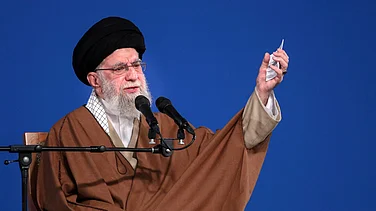In a bold move, mutinous soldiers in Niger have effectively closed the country's airspace, citing concerns of an imminent foreign attack. As the junta continues to defy a restoration deadline set by the West African regional bloc ECOWAS, they have issued a strong warning that any attempt to breach their airspace will be met with "an energetic and immediate response."
The announcement was broadcast on Niger's state television on Sunday night, just hours before the ECOWAS deadline was due to expire. The regional bloc had demanded that the coup leaders reinstate President Mohamed Bazoum or face potential military intervention, as reported by AP.
Responding to the ECOWAS ultimatum, Col. Maj. Amadou Abdramane, spokesperson for the coup leaders, expressed apprehensions about a "threat of intervention being prepared in a neighbouring country." Consequently, the junta declared the closure of Niger's airspace until further notice, indicating suspicions that central African nations might be gearing up for an invasion. However, specific details about these countries were not disclosed. The junta urged the population of Niger to rally in defense of the nation.
The current escalation traces back to a military coup almost two weeks ago, which ousted Niger's democratically elected president and installed Gen. Abdourahmane Tchiani in his stead. This coup has been linked to a power struggle between Gen. Tchiani and President Bazoum, who was reportedly contemplating Gen. Tchiani's removal.
In the midst of these developments, ECOWAS faces a critical decision-making juncture. While Nigeria's Senate expressed reservations about a military invasion, ECOWAS retains the authority to proceed based on consensus.
Significantly, several regional nations have weighed in on the potential use of military force. Guinea, Burkina Faso, Mali, and Algeria have all voiced opposition to such action, with Burkina Faso and Mali likening an assault on Niger to a declaration of war against them. Conversely, Senegal and Ivory Coast have expressed support for ECOWAS' efforts to reinstate constitutional order and have even signaled their readiness to partake in a military operation if required.
In the meantime, the junta's unwillingness to engage in negotiations remains evident. A recent ECOWAS delegation dispatched to Niger was unable to proceed with discussions, as they were only able to meet representatives of Gen. Tchiani.
Nonetheless, the junta leaders continue to garner support. At a recent rally in the capital, Niamey, they reassured their thousands of supporters of their unwavering loyalty, capitalizing on anti-French sentiments to strengthen their position. This sentiment was underscored by the symbolic act of beheading a chicken adorned in the colors of former colonial power France during the rally.
The junta's strategic approach involves distancing itself from France, with whom they had previously collaborated in counter-extremist endeavors. French broadcasters RFI and France 24 were suspended, and agreements with France were severed. Additionally, the junta sought assistance from the Russian mercenary group Wagner, known for its operations in various African nations, including Mali.
The importance of Niger as a counterterrorism partner in the Sahel region, where extremist groups have been expanding their influence, has raised international concerns. The fate of the French and US military presence in Niger remains uncertain.
While some citizens have rallied behind the junta, patrolling the streets at night to safeguard their nation, others remain cautious about the junta's methods. Reports indicate that the junta may be coercing individuals to support them and encouraging citizens to report those who communicate with foreigners.


























